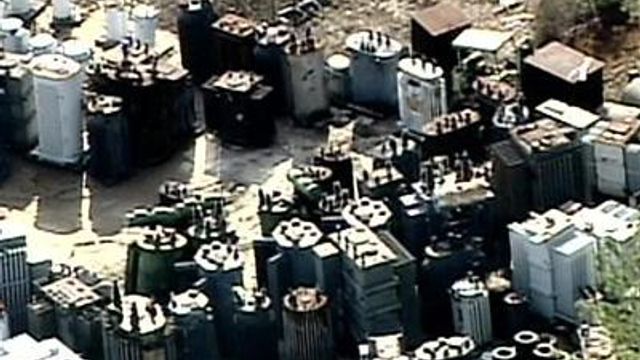RALEIGH, N.C. — Local companies and municipalities could have to pay for the cleanup of cancer-causing chemicals that leaked from a transformer company and its products, contaminating soil and waterways near Raleigh-Durham International Airport.
Several companies and municipalities are challenging a federal law that holds them accountable for the cost of cleanup, saying they were not responsible for the polychlorinated biphenyls, or PCBs, that formerly was used as a coolant in electrical transformers. The PCBs leaked from the Ward Transformers Sales & Services site at 6852 Mt. Herman Road.
"I thought, 'How could we be responsible for something we had nothing to do with?'" Louisburg Mayor Karl Pernell said.
The U.S. Environmental Protection Agency detected high levels of PCBs in soil on several acres of land near the airport in the 1970s. Since then, the chemical has leached into Lake Crabtree and moved downstream.
The EPA plans to clean up an estimated 100 tons of the toxic soil, but Raleigh-based Ward, which filed for bankruptcy, does not have the resources to pay for it.
That puts the responsibility on Ward's four largest customers, including Progress Energy, who are now asking for financial assistance from 125 of Ward's smaller customers – including Louisburg, Peace College and the North Carolina Department of Agriculture and Consumer Services.
The estimated cost of the cleanup is more than $60 million.
Ward maintained the town's transformers from the 1960s to the 1990s.
"We don't feel like we are obligated to do what they are asking us to do, but we're going to have to defend ourselves the best we know how."
Ward's former Wake County location is now a Superfund site, a toxic-waste site designated for cleanup under the U.S.'s Comprehensive Environmental Response, Compensation and Liability Act of 1980. That means the government will do the cleanup and go to court to collect the costs from anyone associated with the PCBs, a legal precept known as joint and several liability.
"It's very frustrating. You just don't know where your liability ends and begins," Louisburg Town Administrator Mark Warren said.
Louisburg recently hired an attorney to help in the fight, as did several of the other smaller customers.
It's the latest chapter in a toxic cleanup that started on the side of the road in the 1970s and continues downstream decades later.
Thirty years ago, Warren County residents protested when PCB-contaminated soil was dumped in a local landfill. Ward had used PCBs in its transformers, and workers with the Raleigh-based company sprayed PCB-laced oil along hundreds of miles of state roads as a way to dispose of it.
The soil was eventually dug up and dumped in Warren County, where officials said it could be sequestered. Local protests claiming environmental racism eventually prompted the state to spend $18 million to clean the landfill.
Because PCBs are usually trapped in sediment at the bottom of streams and lakes, scientists don't believe contact exposure or drinking the water pose major health risks. The primary concern is eating fish that have ingested PCBs while feeding.





